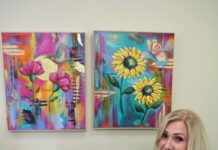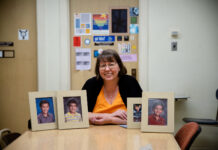
A science professor comes gliding into campus on his bicycle every day, unless it is a rainy day. On this day, he is wearing a white T-shirt with the words, Earth first, before the other planets. In the 12 years of teaching at Pierce he has amassed a closet full of astronomic shirts in which he admits he has spent a ton of money on. As the students glance up at his shirt they know exactly what the lecture is going to be about.
Astronomy Professor and Physics Department Chair Dale Fields said from an early age that he always knew he was going to be some kind of scientist, but didn’t know what kind. He added that it was his father who got him interested in science fiction.
“We didn’t have the internet, so instead we just went to the library and I would get books on space, so I can find out more about what these things were in these science fiction stories,” Fields said. “As I read about these things, I wondered why the authors always left out the fun and really good parts. As a result, I realized the truth was actually more interesting than the fiction.”
Fields said it was then when he realized that space was something that he wanted to know everything about.
Fields grew up in Boise, Idaho, which is in the western part of the state and described it as being very small.
“It is an interior state that doesn’t have a big population,” Fields said. “The whole state could have its population fit in the valley.”
Fields said he spent 10 years in college even though his path was straight forward, because he knew that he was going to be an astronomer since junior high.
“I had four years from my undergraduate at the University of Arizona in Tucson, and then I attended Ohio State University in Columbus, Ohio,” Fields said. “It was six years for both the master’s and Ph.D.”
When it came to looking for different types of jobs, he saw that there was an opening at Pierce and he knew this opportunity was going to be the best bet.
“The goal of Pierce is to be the best teacher that you can be and to, therefore, help people the best you can,” Fields said.
Fields also incorporates critical thinking into his assignments by creating a daily life scenario.
“In my homework and tests, I always do things where I go, okay, let’s apply this to your daily life,” Fields said. “I have this homework question where I ask what happens when a car hits me while I am on my bike and the amount of force applied on each object.”
This is his 12th year of teaching at Pierce, and he is known for having a deep passion for Astronomy, to the point where he comes off as being very nerdy and helpful.
Leetal Cohen, a former student and astronomy tutor, described him as being a well-rounded professor who is enthusiastic and shows a passion for his material during his lectures.
“I have never seen a professor more invested into how well his students do and how much he loves the subject and loves teaching it,” Cohen said. “It’s never boring.”
Not only is he a professor, but he is the Physics department chair, so he believes that it is necessary to make things function.
Associate Professor of Biology and Chair of the Life Sciences Shannon DeVaney said Fields is someone who likes to initiate conversations about student education.
“One of the things that makes him great is he’s not just thinking about his own classes and own students, but how all of us as professors would work together to make each other better teachers,” DeVaney said.
Fields said what he loves most about his job is being able to go into the classroom and see the metaphorical light bulbs go on over people’s heads.
“It’s one of the greatest vicarious thrills that I can get, to actually see people start to understand, to work their way towards this and become more and to become better,” Fields said. “I’ve always wanted people to be better than they are, and teaching is just a great way to help them.”
Fields also believes that science can help people reach their greater potential.
“This is because if you are going to do something,if you are going to be effective, you have to know what is really going on,” he said. “Like if you want to change the political system, you have to understand what the political system is, so that you can actually make the change.”


